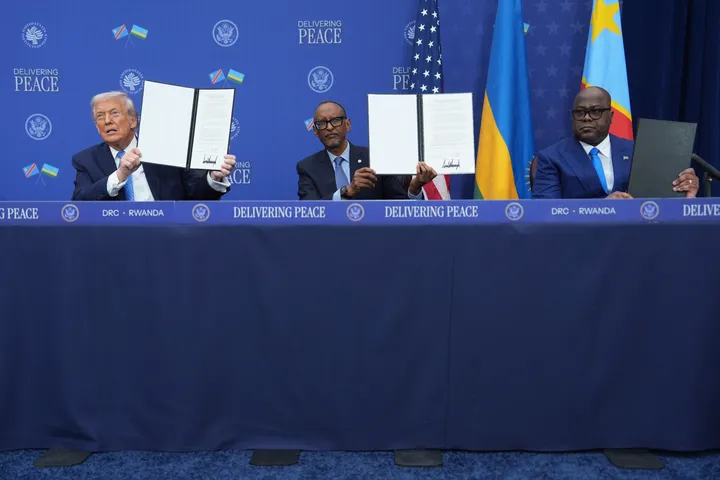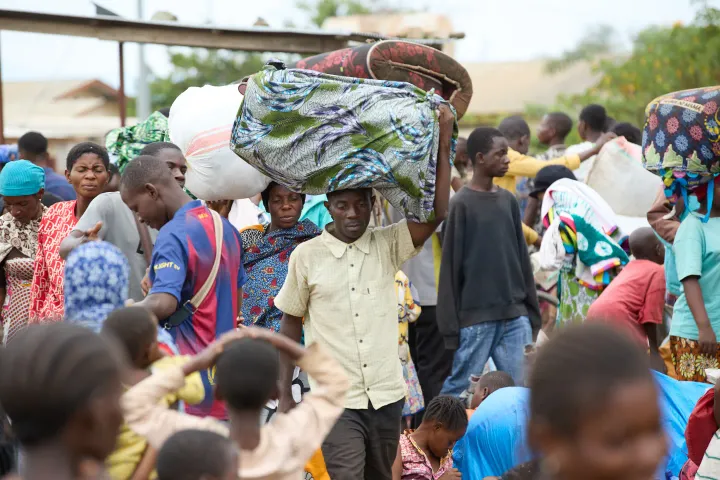By Kudra Maliro
Marie Mutsuva decided to remain a spinster after she was diagnosed with a medical condition that prevented her from conceiving.
Decades later, Mutsuva, 73, is the “maman” – mother – to dozens of children orphaned by a decades-long insurgency that has ravaged the eastern region of DR Congo.
Since 2014, Human Rights Watch says, more than 4,000 people, have been killed by the insurgent group ironically named the Allied Democratic Force (ADF), which the Daesh terrorist group identifies as its branch in Central Africa.
For the children of the civilians killed in the conflict, Marie Mutsuva is their guardian angel. And her modest home in Beni city their happy place.
“It’s been 43 years since I started helping orphaned children after I was told that I could not have children,” Mutsuva tells TRT Afrika. “At the moment, I have 58 children in my orphanage and most of them come from areas where ADF rebels have killed their families.”
Daily struggle
Mutsuva wakes up every morning at 5 to prepare food for the children, aged between nine months to 18 years. She runs her orphanage with donations – in cash and kind – from well-wishers.
She struggles to provide them the bare necessities, but Mutsuva says the joy of hearing them call her “maman, maman… every day” is worth all the hardship.
“We have problems getting food, medical care, school fees, and even finding a place to sleep properly,” she says. “The orphanage has place for only 20 but we are hosting 58 at present …and the number can go up if the war continues.”
Mutsuva tries to trace extended families and relatives of the children but has found the going tough.
Once a month, she is hosted by a local radio station where she shares names and other information about the children in her care.
The last time a child was reunited with her relatives was in September 2017.
“I got a three-year-old girl from Eringeti, about 60 km from Beni,” Mutsuva recalls. One week later, when she spoke about her on the radio programme, “an aunt of the child called me, and the girl was reunited with her family”.
The children, however, are not too bothered about not going back to their families as long as they are under Mutsuva’s loving care.
“I feel confident… as I can continue my studies thanks to my mother Marie Mutsuva,” Glory Somana, 14, tells TRT Afrika.
“This is my family…I consider all the orphans here as my brothers and sisters. When I finish my studies, I will help Mama Marie to provide for the other orphans,” the boy adds.
Hero for all
For people who know Mutsuva, she is a superhero without a cape and they hope that the Congolese government would come to her aid to feed, educate and pay for the medical care of the children.
“For me, it is difficult to feed (the few members of) my family but she does that for 58 children...May God give her life again so that she can accomplish her dream,” says Muhindo Nzala, a neighbour of Mutsuva.
It is a view shared by Captain Antony Mwalushayi, a spokesperson for the Congolese military and part of Operation Sukola I against armed groups in eastern DR Congo.
“The Congolese state must support Mama Marie with food and medical care because she is a courageous woman who gives hope to children who have lost theirs. “Women like Marie Mutsuva, I consider them guardian angels,” Captain Mwalushayi tells TRT Afrika.
“The Congolese army is doing its best to eradicate these rebel groups so that the population of the region can stay in peace. The most vulnerable people during the war are women and children who cannot save themselves during such attacks.”
As the cycle of violence continues, children continue to be caught in the crosshairs of the insurgents.
On January 22, at least five children were among ten people killed in a bomb attack on a Pentecostal church in Kasindi in eastern Congo.
“The latest round of violence is despicable and highlights how eastern DRC is an increasingly perilous place for children,” Grant Leaity, the UNICEF representative in DRC, said in a statement.
“According to doctors at the main hospital in Kasindi, at least 16 children were injured in the bombing, six of whom suffered serious injuries.”
She added that at least 40 children have been separated from their families in an upsurge in violence that has resulted in a civilian exodus from the territories of Djugu, Mahagi and Aru.
“While we strongly condemn all violence against young people, we will not stop working around the clock to protect them and their families,” Leaity said.
























